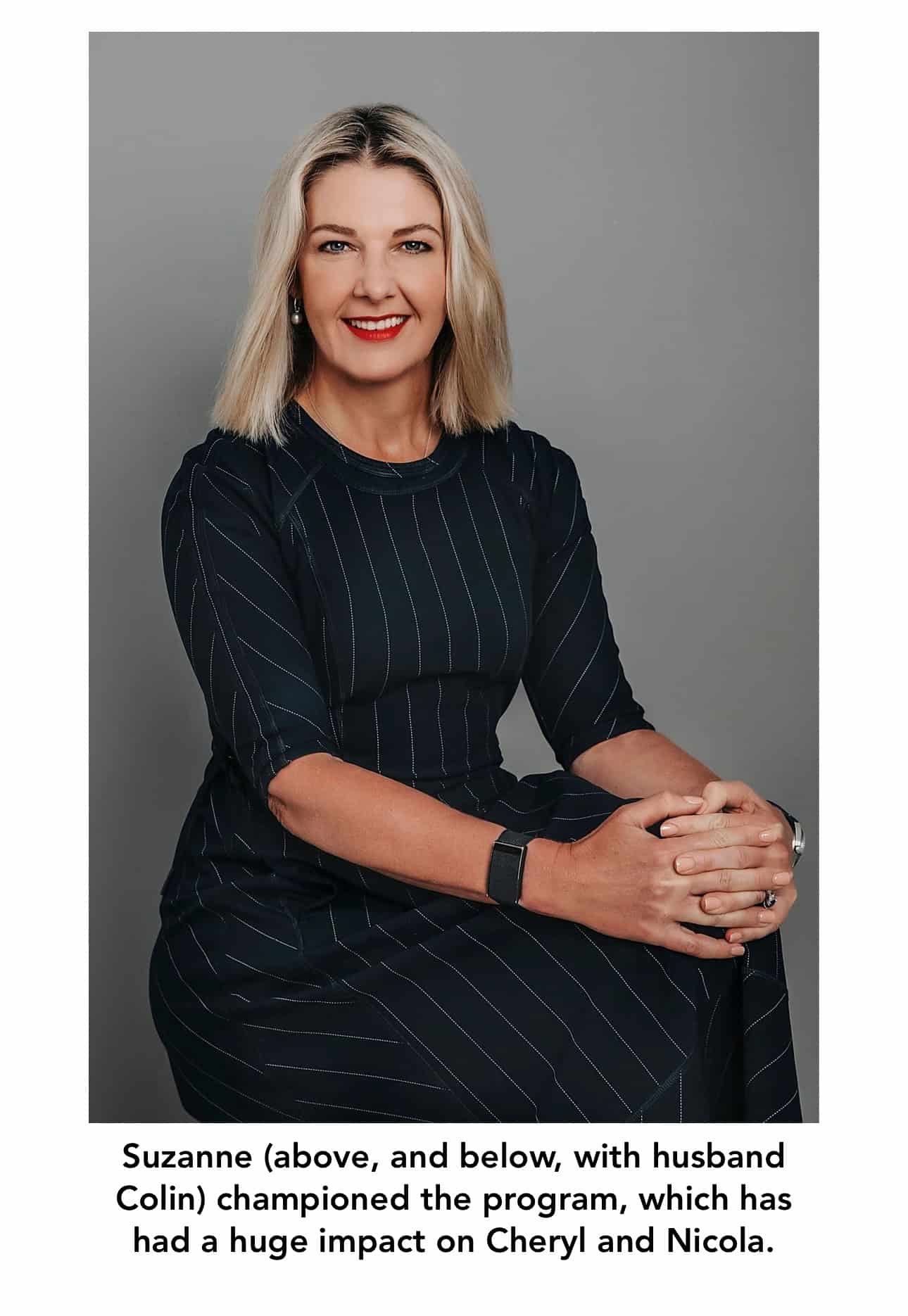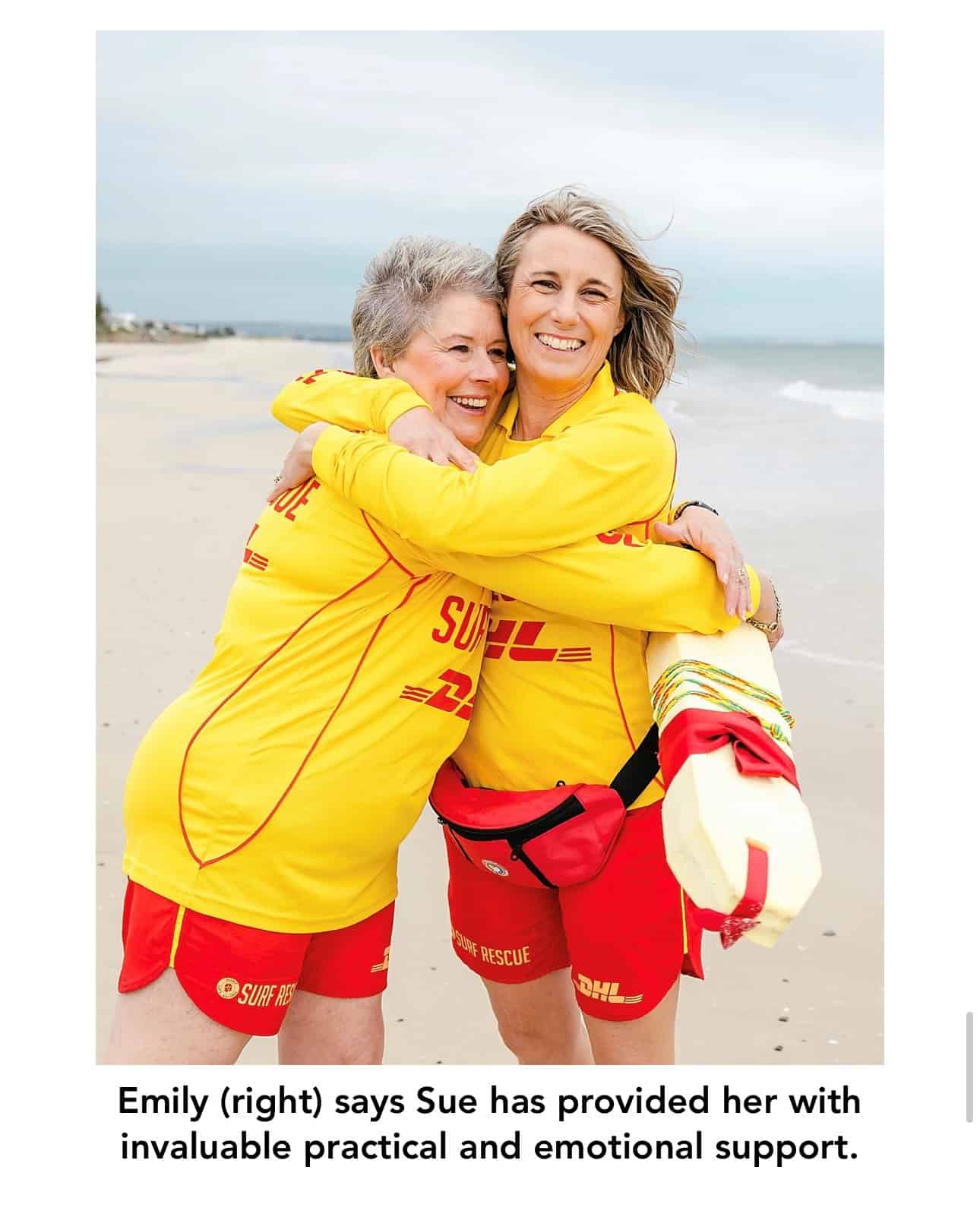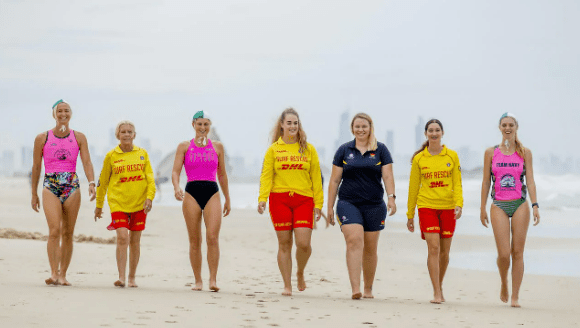In the once blokey world of surf clubs, women are building unbreakable bonds of friendship and support. And the resulting groundswell of improved confidence and courage is flowing down into all aspects of their professional and personal lives.
Words by Samantha Trenoweth – Photography by Will Horner & James Elsby
 When Suzanne Storrie got her start in surf lifesaving, back in the early ’90s, it was “quite blokey” to say the least. The men put on a Christmas show on the roof of her local surf club to which women weren’t invited. It felt like a breakthrough when they asked Suzanne to do their make-up.
When Suzanne Storrie got her start in surf lifesaving, back in the early ’90s, it was “quite blokey” to say the least. The men put on a Christmas show on the roof of her local surf club to which women weren’t invited. It felt like a breakthrough when they asked Suzanne to do their make-up.
“There were comments like, ‘you Sheilas couldn’t organise a tea party.’ It could be quite confronting,” she tells The Weekly.
“There were times when I had to say to myself ‘I’m not going to let this get the better of me’.”
Bear in mind that women had only been admitted to surf lifesaving clubs as full members in 1980 – 78 years after Aussie women got the vote – so the organisation was hardly on the cutting edge of cultural change. But it was an organisation Suzanne loved and valued all the same, and she was determined to be meaningfully involved. So she jumped in at the deep end.
“I learnt how to race surf skis when there were no other women doing that,” she says, “so I raced in the men’s races. I learnt how to drive a rubber duckie – you know, the rescue boats – when there weren’t many women doing that.”
Then, in 1996, in a breakthrough, she was awarded Australian Surf Lifesaver of the Year.
“So much has changed since then,” she says. “Now women make up 46 per cent of the membership of surf clubs, but what hasn’t changed yet is the number of women in leadership roles. Women only hold 20 per cent of leadership positions. That’s what we’re trying to change with this mentoring program. We’re trying to show women that it can be done.”
In July 2020, Surf Lifesaving Australia rolled out it’s Women’s Mentoring program to commemorate the day, 40 years earlier, when women had been admitted as full members. But like that earlier victory, this program was no spur-of-the-moment thing.
Back in 2016, Suzanne – a company director, finance executive and mother of three – had first suggested a women’s mentorship program to the then CEO of Surf Lifesaving Australia, and received a decisive ‘no’.
“I could easily have just given up when I got my first knockback,” Suzanne says, but she’s no quitter. She had been involved in women’s mentorship programs in her day jobs and knew how valuable they could be.
So changing tack, she approached her state CEO. She didn’t even receive a reply. When the national CEO moved on, she went back with another pitch to his replacement. She was told to come back later.
Finally, Suzanne researched and wrote an exhaustive white paper about the benefits of mentorship, and teamed up with Nancy Joseph, the chair of development and an ally. Together, they presented it to the national board (of which Suzanne had become a member) and this time there was interest. The only roadblock was cost, so Suzanne and another supporter, Kerryn Brodie, offered to donate the funds required, and McCarthy Mentoring came on board with its expertise.
“I don’t think we’d have got it across the line without all of us pulling together,” says Suzanne. Four years later they’d won their case.
 On Sydney’s Coogee Beach, two grown women are splashing in the surf like kids, racing through the shallows, kicking up silvery drops of water, laughing in the glorious afternoon sun. Both these women signed up to Surf Lifesaving Australia’s women’s mentorship program in 2021 and since then, they haven’t looked back.
On Sydney’s Coogee Beach, two grown women are splashing in the surf like kids, racing through the shallows, kicking up silvery drops of water, laughing in the glorious afternoon sun. Both these women signed up to Surf Lifesaving Australia’s women’s mentorship program in 2021 and since then, they haven’t looked back.
Nicola Logan arrived in Coogee from the UK 15 years ago, joined the surf club to make friends and never left. She put her hand up for the mentorship program to give herself a confidence boost and to help her navigate some of the remnants of traditional blokey culture in her local club.
“When we got together, all the mentors and mentees,” she explains, “we found most of us had encountered pretty similar barriers. Men might say they’re all for equality, but do they actually understand how the females feel when there are a lot of in-jokes and crude and rude comments? We all talked about that. I think it’s difficult for women to interject and feel that they have a safe spot.
“Traditionally, surf clubs have been where men go and hang out on a Sunday afternoon and have a beer. But just because you don’t necessarily want to have a beer every Sunday doesn’t mean you don’t want to contribute … I think the organisation needs to know why women are not going for these leadership roles. It’s not because they’re not capable. That’s what I’ve realised now. It’s not because I’m not capable. It’s just very daunting,” says Nicola.
“Having the support of your mentor, knowing you have a voice, exploring different ways to approach things – it all really helps.”
Her mentor was Cheryl McCarthy, a flood response coordinator with Surf Lifesaving NSW. “The last few months have kept me on my toes,” she admits. “At the moment we’re deploying surf lifesaving teams to help the SES in Bourke, Brewarrina, Walgett, Condobolin, Forbes, Hay, and we’ve got four people and a boat out at Menindee as well.”
Over the years, Cheryl, who is 48, has also volunteered as a Bronze Medallion trainer, a Nippers coordinator and secretary of her local club in Bermagui on the south coast of NSW. That diversity of experience made Cheryl a perfect sounding board for Nicola who, at 45, was thinking about taking on more responsibility at her club.
“If someone had said to me three years ago that I would be chairing a management committee meeting, I’d have said, ‘no way’, but I’ve done that now,” she says cheerfully.
“And in May last year I was MC at the annual dinner. They’d never had a female MC before. So the big thing for me in this mentorship experience was gaining confidence.”
And that confidence also rippled out to Nicola’s life beyond surf. Since she arrived in Australia, Nicola has worked as a primary-school teacher, in one school for 14 years, but a mentoring session on resilience and risk-taking encouraged her to ask some challenging questions.
“There was one particular question,” she remembers. “‘How often do you actually open yourself up to risk-taking? What’s holding you back from trying something new?’ My trajectory in life had always gone one way. I’d never deviated. But talking with Cheryl, I realised that it’s okay to take a new direction.”
The upshot is that Nicola has just begun a new position as a child development and welfare practitioner with a not-for-profit group.
“It’s the steepest learning curve I’ve ever had,” she says with a wide smile. “It’s amazing what happens when you open yourself up. The past two years for me have been so different, so great.”
And the program has helped Cheryl to grow too.
“When someone first suggested to me that I should put my hand up to be mentor,” she admits, “I thought, ‘I can’t do that, I don’t know enough, I haven’t had long enough in surf’. But I think a lot of us have more to offer in that space than we realise. A willingness to listen, and to talk through things without judgement are important skills.
“It would be great if more people could put their hands up – not just in surf lifesaving but wherever they are – to grab those younger ones as they come through the ranks and quietly encourage them. I think that’s important in any part of life.”
Cheryl says she too has gained confidence, but that’s not what she’s valued most about the program. The most important thing she’s gained is a new friend. “Nicola is an incredible woman,” she says with a gentle nod of the head, “and I’m really privileged now to count her as a friend.”
Sue Mitchell, 60, and Emily Price, 42, meet on a soft, grey day on Henley Beach in South Australia, and wrap each other up in a hug. Their mentorship program ran right through COVID so their chats were always on the phone or online. This is the first time they’ve met in real life, and they’ve been looking forward to it for weeks.
Henley is Sue’s local surf club, and when the program began, Emily was based just across Bass Strait in Burnie, Tasmania. But not anymore – and that’s been one of the most exciting developments to have come from the mentorship.
Emily applied to be a mentee because, “I really felt that I wanted to be a leader,” she says. “My husband, Johnno, is very good at the external leadership, whereas I’d always been more in the background, working on the fine details and the spreadsheets and flyers. So I wanted to create my own path. I wanted to say, ‘He can be in one of your leadership positions, but I could do that too, and do it just as well – just differently.’
“It was actually Johnno who found the mentorship program and said, ‘This might be what you need.’ I don’t even think I let the club know I’d applied, and I was so shocked when I was accepted. I was so excited.”
The experience changed every aspect of Emily’s life.
“From a surf club perspective,” she says, “Suzanne Storrie gave us a piece of advice in an early session, which was, ‘Just say yes and work out the details later.’ And I’ve used that all the time.”
The first challenge she set herself was to organise and host a breakfast for women in surf. “It was 2020, the 40th anniversary of women in surf, and I was in the middle of this mentoring program. The aim was 40 years in surf, get 40 women at our breakfast, and I did it. I organised a breakfast. I was the MC, I had never been an MC before. That was really significant because at Burnie Surf Club, the MC is always my husband – always – and then it was me with a room of 40 women!”
Then came an even bigger challenge. She and Johnno decided it was time for a change in their lives and they were thinking about perhaps moving somewhere warmer, where they could spend more sunny beach days with their two boys. So Emily plunged right in and started applying for jobs on the NSW north coast. And she got one! With Sue’s encouragement, she ‘just said yes and worked out the details later’.
“Sue is completely responsible for our move,” Emily laughs. “She is an absolutely phenomenal, inspirational woman and mentor.”
Johnno also looked for work, and found it. They travelled north to check out the local surf club at Redhead, and loved it. And in the middle of COVID, they packed up their lives and moved to Lake Macquarie, two hours north of Sydney. So far everything is working out a treat.
“I’m not saying you should say yes to every situation,” Emily cautions, “but this program has given me more confidence and it’s opened up so many opportunities. It flows through into work as well. Next week I’m presenting to 500 people at a virtual conference based in Saudi Arabia. Am I petrified? Yes. But Sue and the program gave me the confidence to say yes.”
“I think that was what was so special about the program,” says Sue. “Initially it was conceived on the basis of growth and development within surf, but it has looked at the whole picture of a person’s life, and it’s challenged self-reflection. We went a long way together. I was really privileged to be that person for Emily.
“And the big bonus is that, this year, she has been accepted into the program as a mentor. I feel really proud of that.”
Almost 200 women have now been through (or are in the middle of) the program, and there’s no doubt that it’s changing the organisation and changing individual lives.
“If we can give women confidence and say, ‘We believe in you, and if you want to take on a leadership position, we’ve got your back,’ that’s a really good thing,” Emily says finally.
“In making better surf lifesavers, we’re also making better young adults, better mothers, better career women, better wives. We’re teaching women the skills to be vulnerable, to take on new challenges, to try new things, to be the best they can be. That’s not just great for surf lifesaving, it’s great for society. It’s great for us all.”
“In making better surf lifesavers, we’re also making better young adults, better mothers, better career women, better wives. We’re teaching women the skills to be vulnerable, to take on new challenges, to try new things, to be the best they can be. That’s not just great for surf lifesaving, it’s great for society. It’s great for us all.”


